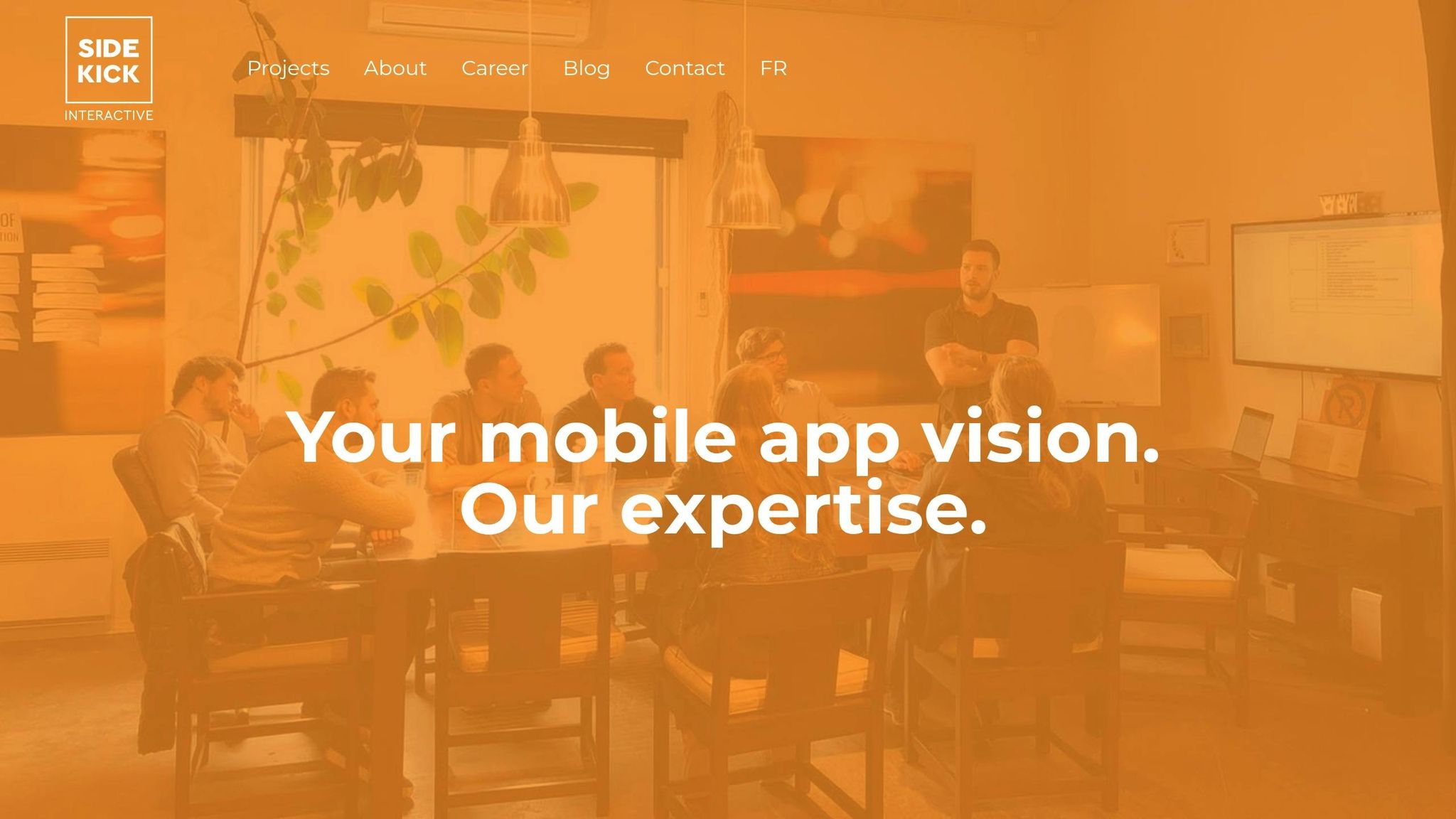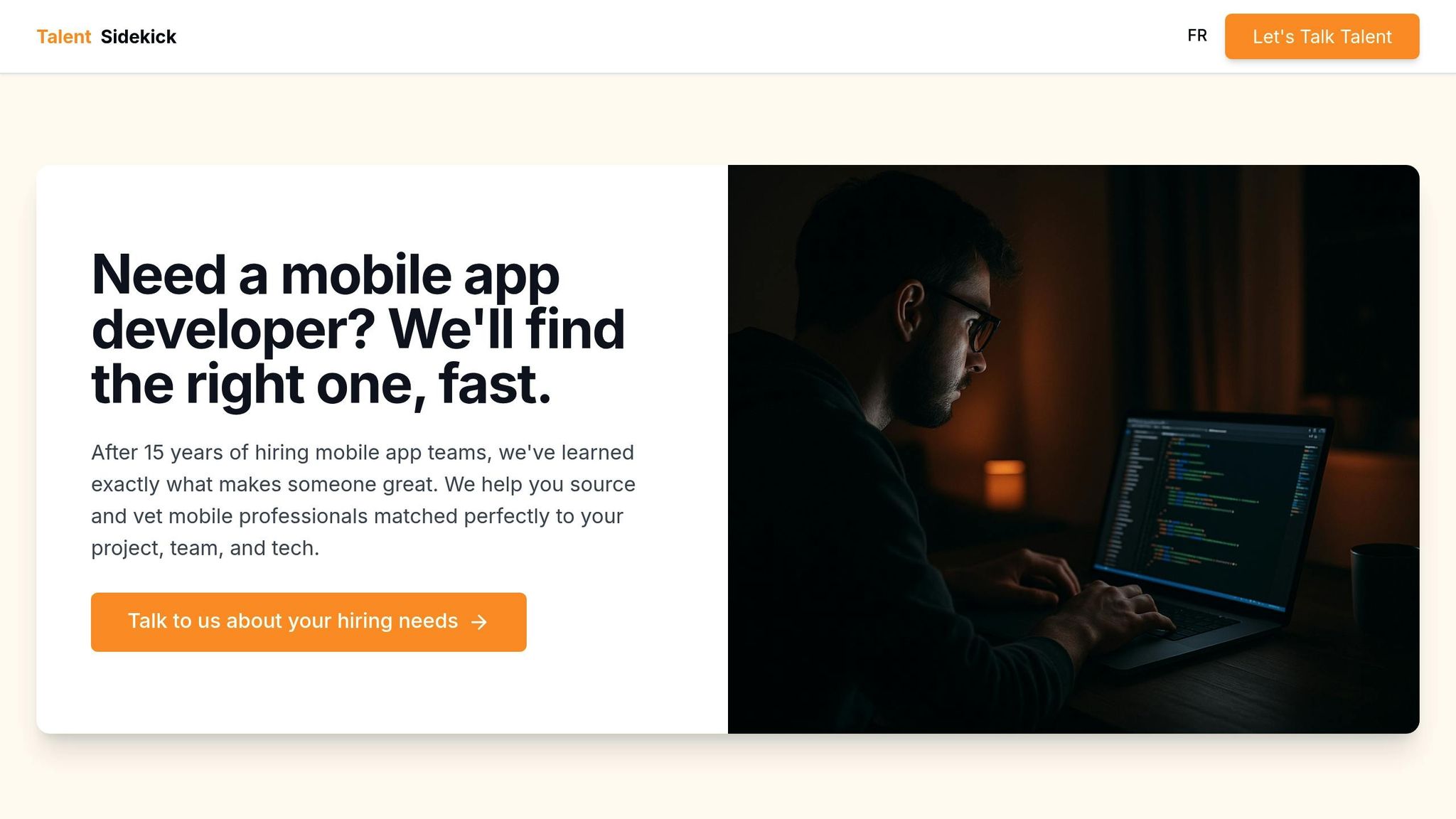What sets great mobile developers apart? It’s not just their technical skills or programming expertise listed on a resume. The best developers think beyond the code – they focus on user needs, solve complex problems, and adapt to emerging challenges. These hidden skills often determine whether an app succeeds or fails.
Key Insights:
- User-first mindset: Great developers prioritize intuitive, user-friendly designs that solve real problems.
- Problem-solving skills: They identify and address root causes, not just surface-level issues.
- Flexibility with tools: A strong grasp of fundamentals enables them to quickly learn new technologies.
- Collaboration: They align technical work with business goals and communicate effectively with teams.
Why does this matter? Resumes don’t capture these traits, yet they’re critical for delivering apps that are functional, secure, and engaging. Hiring managers should look beyond technical qualifications and focus on these hidden strengths to find the best talent.
Soft Skills You Need To Get Hired as an iOS Developer
The Core Hidden Qualities of Top Mobile Developers
Top-tier mobile developers share three key traits that often fly under the radar: adaptability, a user-first mindset, and exceptional problem-solving skills.
Flexibility with New Technologies
Even though only 3.4% of professional coders identify as mobile developers, mobile apps dominate digital engagement, accounting for over half of all global digital time spent. This fast-paced landscape requires developers to stay ahead of ever-changing frameworks, tools, and technologies.
Their secret? A strong grasp of programming fundamentals. Armed with knowledge of data structures, algorithms, and design patterns, they can quickly learn and apply new tools when faced with challenges. This ability to adapt is critical, especially considering that 64% of IT recruiters report struggling to fill tech roles due to skill gaps.
"The tech landscape is constantly changing, and mobile app developers must be open to learning modern technologies, frameworks, and development tools."
This adaptability doesn’t just help developers keep up – it also lays the foundation for creating user-focused, impactful apps.
User-Focused Mindset
Technical expertise may build an app, but a user-focused mindset ensures people actually enjoy using it. Developers who prioritize user needs over technical details create apps that resonate with their audience.
The benefits of this approach are clear:
| User Engagement Factor | Impact |
|---|---|
| Apps with 100+ reviews | Average 4.2-star rating vs. 3.5 stars for apps with fewer reviews |
| User satisfaction score of 85+ | 60% more likely to see increased referrals |
| In-app feedback implementation | 30% increase in user engagement |
| Quick iterations based on feedback | 25% reduction in development time |
For instance, a user-focused developer might design an app with busy professionals in mind, ensuring the interface is intuitive and efficient. This mindset also extends to issues like data privacy and security. Developers who build systems aligned with how users perceive privacy foster trust, which can lead to a 40% boost in user loyalty.
"Being human-centred is an additional cost to any project, so businesses rightly ask whether taking so much time to talk to people, produce prototype designs and so on is worthwhile. The answer is a fundamental ‘yes’." – David Benyon, Professor
Advanced Problem-Solving and Critical Thinking
Mobile development often involves untangling complex challenges. In fact, around 70% of a developer’s time is spent diagnosing and fixing issues. Developers with strong analytical skills can resolve errors up to 30% faster.
The best developers don’t just patch problems – they investigate deeply. By analyzing user behavior, system performance, and data flow, they identify and address root causes.
"In mobile applications development, problem-solving is a critical skill that can make or break a project’s success. It involves identifying issues, analyzing them, and crafting effective solutions."
This methodical approach has measurable results. Projects that emphasize structured problem-solving see a 50% drop in recurring issues, while organizations that prioritize in-depth analysis cut project failure rates by 40%. Critical thinking also means challenging assumptions. For example, when a client requests a specific feature, top developers evaluate whether it solves the actual business problem, often proposing more effective alternatives.
The demand for these skills is rising, with job postings requiring analytical thinking increasing by 30% over the past five years. In a world where mobile apps must integrate with APIs, cloud services, and operate across diverse devices and conditions, developers who think critically deliver more reliable and scalable solutions.
Together, these qualities enable developers to craft mobile experiences that are not only functional but also deeply engaging for users.
The Habits and Work Ethic That Drive Success
While technical skills and problem-solving abilities are crucial, it’s the daily habits and strong work ethic that truly set successful mobile developers apart. These practices ensure their skills translate into consistent achievements in a highly competitive field.
Continuous Learning and Improvement
In the fast-moving world of app development, keeping up with new technologies isn’t optional – it’s a must. Top developers dedicate time each week to mastering new frameworks, tools, and techniques. They actively engage with developer communities, webinars, and peers to stay informed and sharpen their expertise.
This commitment allows them to seamlessly integrate advanced features like AI or AR into their apps, giving them a competitive edge. They also embrace feedback from code reviews and retrospectives, treating challenges as opportunities to grow rather than obstacles to avoid. This mindset naturally translates into disciplined daily routines focused on self-improvement.
Time Management and Attention to Detail
For successful developers, productivity isn’t about working longer; it’s about working smarter. Studies show that setting goals can boost productivity by 30%, and writing those goals down increases the likelihood of achieving them by 42%. That’s why great developers start their day with a clear plan. They use tools like Jira, Trello, or Asana to prioritize tasks and break large projects into smaller, manageable steps.
This structured approach is especially valuable during debugging and problem-solving, where staying focused and organized can make all the difference.
"It’s important that we stay on track with our daily tasks so we don’t burn out early during the work week."
– James Costian, Senior Software Developer at QliqSOFT
Attention to detail is another hallmark of great developers. With 62% of users abandoning apps that are difficult to navigate and 74% basing purchasing decisions on user experience, every small detail matters. Successful developers conduct continuous testing throughout their workflow, ensuring functionality at every stage rather than waiting until the end.
They also understand the link between physical health and mental focus. Will Manuel, President of Core Mobile App Development, emphasizes that physical movement can enhance mental clarity. This balance between physical and mental well-being helps developers stay sharp and productive.
Collaboration and Clear Communication
Mobile development is rarely a solo effort. The most successful developers excel at teamwork, bridging the gap between technical challenges and business goals. They spend significant time collaborating with cross-functional teams and stakeholders to ensure everyone is aligned on project objectives.
This collaborative mindset is especially critical in projects involving advanced technologies, as the workplace transformation market is projected to grow significantly – from $18.9 billion in 2022 to $69.9 billion by 2030. Developers who can clearly explain technical concepts to non-technical stakeholders become indispensable team members who drive projects forward.
Reliability, discipline, and professionalism are core traits of these developers. They recognize that technical expertise is only part of the equation – being organized, managing time effectively, and focusing on one task at a time are just as important for delivering consistent results.
sbb-itb-7af2948
How Hidden Skills Drive Project Success
Hidden skills play a crucial role in the success of mobile app projects by addressing complex challenges that could otherwise derail progress. When developers bring adaptability, critical thinking, and a collaborative mindset to the table, they can tackle emerging technologies and solve intricate problems like security vulnerabilities and operational inefficiencies. These often-overlooked abilities transform obstacles into opportunities for impactful project outcomes.
Case Study: Advanced Tech Integration
In 2023, Sidekick Interactive collaborated with a manufacturing client to integrate Apple Vision Pro capabilities into their existing quality control app. The project involved implementing 3D scanning technology to detect microscopic defects in automotive parts – a task that went far beyond the scope of typical mobile development.
The team’s adaptability was key. They quickly got up to speed with Apple’s RealityKit framework, despite limited documentation. When the 3D scanning results were inconsistent, their critical thinking pinpointed poor factory lighting as the root cause.
"Critical thinking is more than just a useful skill for developers – it’s a secret weapon that can elevate your career." – Aryan Kumar, Author at Medium
Collaboration also played a pivotal role. Instead of working in isolation, the developers partnered with the client’s engineering team to understand the specific defect patterns that needed detection. This teamwork led to the creation of a custom algorithm, significantly outperforming off-the-shelf solutions.
Their curiosity and willingness to experiment pushed the boundaries of Apple Vision Pro’s capabilities. Additionally, their understanding of user behavior psychology helped them design an intuitive interface that factory workers could easily navigate, even in challenging conditions. The result? Enhanced quality control processes and significant cost savings for the client.
This example highlights how custom native app development often hinges on innovative solutions and seamless integration.
Resume Skills vs. Hidden Strengths: A Comparison
The difference between traditional resume skills and hidden strengths illustrates why the latter are so impactful.
| Resume Skills | Hidden Strengths | Real-World Impact |
|---|---|---|
| "5 years iOS development experience" | Adaptability to emerging technologies like AI, AR/VR, and IoT | Enables integration of advanced features, giving apps a competitive edge |
| "Proficient in Swift and Objective-C" | Critical thinking for strategic problem-solving | Identifies and resolves complex bugs, improving code quality and efficiency |
| "Experience with REST APIs" | A security-first mindset for encryption and data protection | Helps mitigate vulnerabilities found in one out of every four mobile apps |
| "Agile methodology experience" | User-focused design and behavior psychology insights | Develops interfaces that boost customer loyalty by up to 400% |
| "Team collaboration skills" | Cross-functional communication and stakeholder alignment | Reduces scope creep – an issue in over half of projects – by setting clear expectations |
The numbers tell a compelling story. Projects involving co-creation have a 30% higher success rate than those without collaborative efforts, and 56% of developers cite communication and teamwork as the most critical skills for cross-functional success.
Security awareness is another hidden strength that’s becoming increasingly essential. With one in four mobile apps containing high-risk vulnerabilities, developers who think beyond coding can help companies avoid costly breaches. For example, when Apple introduced Privacy Nutrition Labels for App Store submissions in 2020, developers had to audit not only their own code but also every third-party SDK they used. Those already focused on security were better prepared for this shift.
User experience is equally critical. Developers who understand that 62% of users abandon apps due to poor navigation naturally prioritize intuitive design. This attention to detail enhances app ratings and engagement.
As technology continues to evolve, these hidden skills become even more valuable. Since mobile devices surpassed desktops in Internet usage back in 2016, innovation has only accelerated. Developers who adapt quickly, solve problems strategically, and collaborate effectively consistently deliver projects that exceed expectations – no matter what their resume might say.
Conclusion: Finding and Developing These Strengths with Sidekick Interactive

The qualities that make top mobile developers stand out – like adaptability, user-focused thinking, and problem-solving – are the driving forces behind successful projects. These less obvious strengths enable developers to turn challenges into creative solutions, no matter the complexity of the task.
Finding Top Talent through Talent Sidekick

Sidekick Interactive takes a unique approach to identifying these hidden strengths with its Talent Sidekick service. Drawing from 14 years of mobile development experience, Talent Sidekick evaluates candidates in ways that go beyond standard resumes and certifications.
Instead of just checking for technical qualifications, Sidekick’s senior mobile experts assess how candidates handle real-world scenarios. They look at how developers have adapted to shifting technologies, evaluate user-focused thinking based on past project results, and test problem-solving skills with challenges that reflect actual client needs.
This method ensures companies gain access to developers who are prepared to handle complex integrations, collaborate effectively, and deliver secure, user-friendly solutions. Sidekick also offers flexible hiring arrangements – whether you need short-term support, long-term commitments, or hire-to-perm options – tailored to your specific project and team requirements.
Key Takeaways for Hiring Managers and Aspiring Developers
For hiring managers, Sidekick Interactive’s approach highlights the importance of prioritizing these hidden strengths. With poor communication cited as the cause of failure in 65% of projects, it’s crucial to look beyond just technical skills.
Consider incorporating behavioral interviews to uncover how candidates solve problems and work with others. Ask about experiences adapting to new technologies or collaborating with non-technical team members. Scenario-based questions can reveal how candidates approach challenges, while involving your current team in the process ensures a strong team dynamic.
"Research indicates that companies with strong cultural alignment have a 30% lower turnover rate" – Ana Crudu & MoldStud Research Team, MoldStud
Practical coding assessments that reflect real-world mobile development tasks – like performance optimization, API integration, or responsive design – are another effective way to evaluate how candidates think through complex problems.
For developers looking to grow, the focus should be on mastering the fundamentals of mobile development rather than chasing every new framework. A solid foundation in Android or iOS development will prepare you to adapt to changing programming languages and industry trends.
"To stay adaptable as a mobile developer in the face of changing programming languages, I believe that programming languages are relatively easy to learn and adapt to. What truly matters in a volatile market is your knowledge of the fundamentals of mobile app development. Instead of focusing solely on programming languages, you should concentrate on strengthening your core understanding of Android or iOS development. Once you have a solid grasp of the fundamentals, you can then learn the programming languages that are in demand in the industry to build mobile apps effectively. This approach will ensure that you remain versatile and competitive regardless of changes in programming language trends." – Dhruv Limbachiya, Software Engineer
Continuous learning is key. Seek feedback from users, clients, and mentors. Participate in peer code reviews to refine your skills and develop better collaboration habits. Join online communities to exchange ideas and tackle challenges with others in the field. Mentorship programs – whether you’re the mentor or mentee – can also accelerate your growth.
Finally, embrace change. Mobile development is a fast-moving industry, and those who see new technologies as opportunities rather than obstacles will always have an edge.
Whether you’re looking to hire top talent or sharpen your own skills, remember that technical expertise might open the door, but it’s these hidden strengths that lead to lasting success in mobile development. Use these insights to propel your next project forward.
FAQs
What are the best ways to uncover the hidden strengths of mobile developers during hiring?
To get a deeper sense of a mobile developer’s potential, it’s important to go beyond their technical expertise and look at their soft skills and approach to problem-solving. Behavioral interview questions can be a great way to gauge how they handle challenges, learn new tools or technologies, and balance user needs with project demands. Pair this with hands-on technical assessments to see how they work in real-world scenarios, showcasing their teamwork, creativity, and ability to incorporate advanced solutions.
During technical tests or group exercises, pay close attention to how candidates communicate and collaborate. These moments can highlight qualities like clear communication, user-focused thinking, and a team-oriented attitude – all critical traits for succeeding in custom mobile app development and managing complex tasks effectively.
Why is focusing on user experience more important than just technical skills in mobile app development?
A strong emphasis on user experience (UX) often outweighs technical skills when it comes to creating apps that truly connect with people. Sure, technical know-how is vital for building a functional app, but it’s the user-focused design that keeps people coming back.
When developers put the needs of users first, they design apps that feel natural to use, are enjoyable, and solve actual problems. This approach leads to higher adoption rates, better retention, and stronger loyalty – essential ingredients for standing out in a crowded market. On the flip side, even the most technically advanced app can quickly lose users if it doesn’t meet their expectations.
Ultimately, understanding what users genuinely need and delivering on that is what transforms a decent app into an exceptional one.
How can mobile developers stay adaptable and sharpen their problem-solving skills in a rapidly evolving tech industry?
To excel in the ever-evolving tech world, mobile developers need to prioritize ongoing learning and practical experience. Keeping up with new technologies, working on real-world projects, and staying informed about the latest industry trends can make a big difference in building skills and staying relevant.
Working closely with peers, embracing constructive feedback, and learning from past challenges are equally important. These practices sharpen problem-solving abilities and help developers approach complex tasks with confidence and a fresh perspective.
Related posts
- Why Most HR Teams Struggle to Hire Great Mobile Talent
- Red Flags When Hiring Mobile Talent – That Non-Tech Recruiters Miss
- How do I write a mobile developer job description that attracts the right candidates?
- What should I include in a job description to find developers who are a good fit for my app project?

